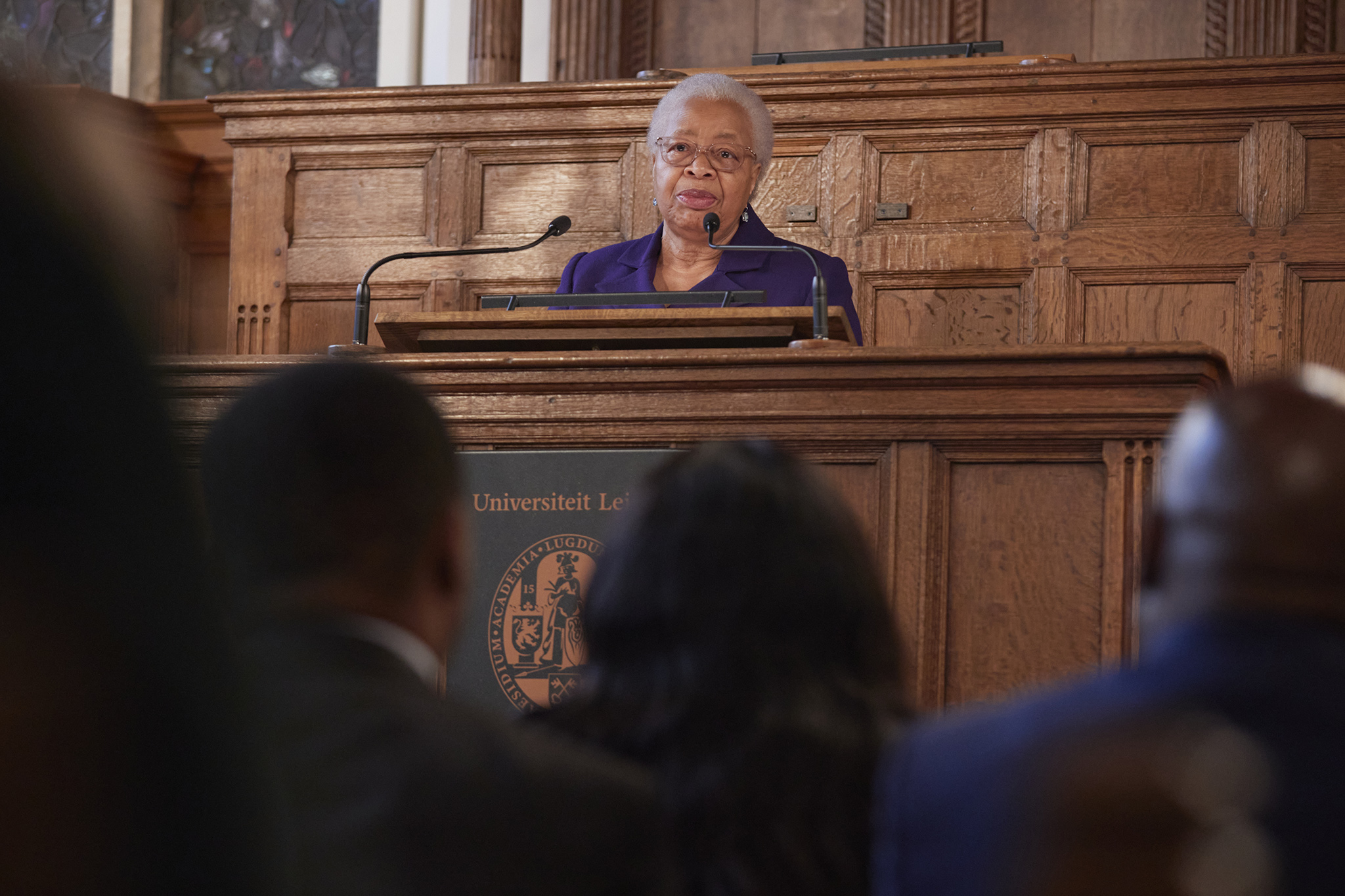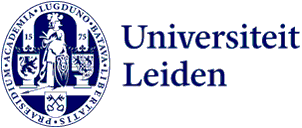
Dr Graça Machel in Leiden: human rights, the crucial role of academia and the importance of intergenerational dialogue
Almost three years after receiving her honorary doctorate, Dr Graça Machel returned to Leiden University. Over the course of two days she spoke with students, researchers, and other interested persons, about human rights – particularly those of women and children – in a world in which these are continually threatened.
Human being as the measure of all things
In her speech, Dr Machel spoke of the university as a space ‘for the maximum expression of respect and human dignity’. ‘It is a space where reflection on a human being as “the totality of everything” is assumed with the deepest substance. Academia as a space of knowledge is simultaneously a space that seeks to find the best option to protect human dignity and achieves it through humanistic and universal training.’
The academic world takes the human being as ‘the measure of all things’. This, according to Dr Machel, is a fundamental prerequisite when it comes to the protection of human rights. ‘The protection of human rights can only be successful when it is carried out with the awareness that all the people of the world are equal, that all men and women, regardless of where they come from, have the same rights, the same dignity.’

Who is Dr Graça Machel?
Graça Machel is a Mozambican politician and a child rights activist. Machel received an honorary doctorate from Leiden University in 2021 for her commitment to the rights of women and children in Africa and elsewhere. She was the first minister of education and culture in Mozambique in 1975 and has fought for the rights of women and children around the world in many different roles. She is one of the founders of The Elders, an independent group of global leaders who work together for peace and human rights. She set this group up with her husband Nelson Mandela, the former president of South Africa who died in 2013. For more information: Honorary doctorate for child rights activist Graça Machel.
Academia as the vehicle for change
Machel therefore believes it to be the duty of academia, as an intellectual, cultural, and academic medium to put human rights on the agenda and protect them. The university has the knowledge, connections, and tools to contribute to lasting change. ‘It is the duty of academia to share this knowledge with those in power. It is the duty of academia to educate those who do not have the expertise necessary to better advance their struggles for human rights. Through the expertise and knowledge of researchers we can ask critical questions to those who violate human rights and denounce their actions.’
‘But how can we ensure that the people in positions of power listen to research, on for example the climate crisis?’ This question came from a member of the audience. Machel let out a deep sigh. ‘It is a tragedy that we are not at the stage where we have reached consensus about what climate change means. Decision makers do not create the space to listen to those who table the problems. We need to create that space. But how? By working together with civil society organisations. The organisations see people and the impact of crises on these people, and women and children specifically. Those involved in conflict do not see this or do not want to see this.' Machel emphasised that civil society organisations play a crucial role in utilising knowledge generated from universities and converting it into concrete actions aimed at protecting human rights in times of major planetary crises, in Africa and elsewhere. 'Civil society organisations will use all means to push for change.'

Give children a seat at the table
After Dr Machel’s speech, various researchers of Leiden Law School were given a moment to present their research on children’s rights and Africa. Research has been conducted, for example, on the role of children in global crises. Tlholohelo Lehlekiso, the first student to receive the Graça Machel scholarship, presented her research on the protection of children’s rights in the wake of the climate change crisis in Africa. ‘The consequences of climate change are far-reaching and impact human rights. Children are often excluded from the discussion on how to solve climate change, even though they are its biggest victims.’ She expressed her gratitude to Graça Machel for her impactful contributions. 'You paved the path that allows me to be here today. Receiving this scholarship feels like breaking the glass ceiling.'

Change must be demanded
The audience came from all over the world. It was diverse and international, but one question played on many of their minds: 'how can women break the glass ceiling?' Three women, from Mexico, India, and El Salvador, all stood up to ask this question. ‘How can we achieve leadership when this is still an area dominated by men, partly due to religion and tradition?’
Machel called it one of the biggest challenges confronting the human race today: accepting women as equal. She emphasised that it is, however, a man-made structure ‘that has been very carefully built along centuries’. This structure tells men that they have the right to act superior to women and that women are inferior by nature. ‘But I want to be clear’, continued Machel, ‘this is not nature. And what is man-made can also be dismantled by human beings. But you have to fight for it. Nobody's just going to hand it to you.' She also pressed home that ‘by making connections with other young people you can fight these structures. Look at what is happening now. The university has given you the space, three women from different countries, to talk about this issue today. You have the means and the knowledge to challenge this structure. Look the person who is oppressing you in the eye and say 'no, you are not going to do this to me'. You must believe in it; it is your right!’

Older does not mean wiser
Machel concluded her speech by highlighting the importance of intergenerational discussion. ‘In building a society of justice we need to communicate with each other. We elders must create the space to listen to young people and consider their perspectives. Just because we are older doesn't mean we know more than you, it means we have different experiences.' She emphasised that dialogue must respect different experiences and perspectives. ‘Academia is essentially a place for intergenerational dialogue. And the university is an excellent place where these conversations can be had.'
Finally, she addressed the younger generation directly: ‘change needs to be demanded and it is your right to do so. This is your moment to realise that equal work means equal pay. I do not want to give you three decades to bring about change. You have better tools than we did to start campaigns. This is your right.’

On 27 October Dr Graça Machel also delivered a speech in the 'Groot Auditorium' of Leiden University. She gave the speech titled "Intergenerational Justice and Human Rights in a Time of Planetary Crises in Africa" and then engaged in several panel sessions with various researchers and members of the UN. Read more about this event in the Dutch newspaper 'Leidsch Dagblad'.
Below a photo report of Friday's visit.
Text: Mireille van der Stoep
Photos Thursday: Monique Shaw






